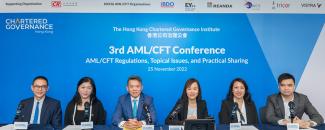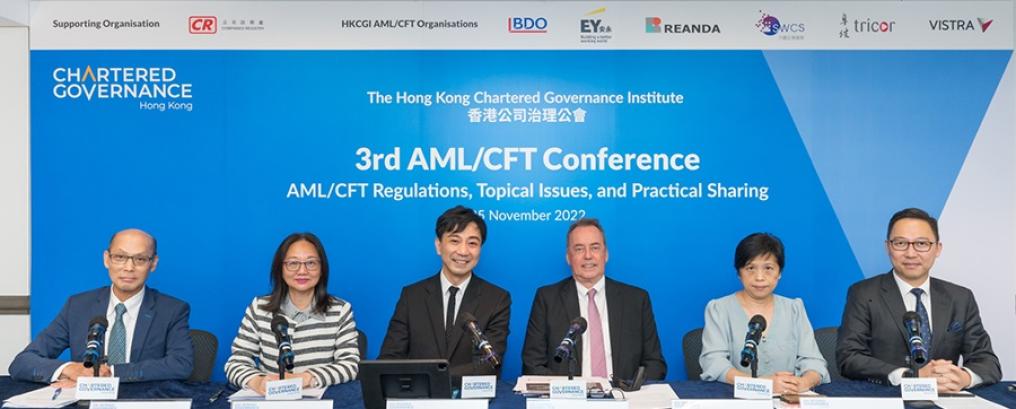The Institute’s 3rd AML/CFT Conference updated practitioners on the trends to watch in AML/CFT compliance.
The Institute’s 3rd AML/CFT Conference, held on 25 November 2022, provided expertise and practical sharing on the impact of current and future trends on trust and company service providers (TCSPs) in Hong Kong. This second part of our review of the conference highlights the key trends discussed in the forum.
Rising expectations
The first speaker in the Panel Two session of the conference, Amanda Diep, Director, Regional Head of Compliance, North Asia, Vistra, looked at the global AML/CFT trends impacting Hong Kong.
‘Global developments give a good indication to TCSP practitioners in Hong Kong of the driving forces behind the current regulatory and stakeholder expectations,’ she said.
A good example of this, she pointed out, is the way that investigative journalism has shone a spotlight on the role played by TCSPs in offshore financial abuses. The Panama Papers in 2016, followed by the Paradise Papers in 2017 and more recently the Pandora Papers in 2021, have led to mounting pressure on TCSPs to enhance their integrity, transparency and effectiveness with regards to addressing money laundering (ML) and terrorist financing (TF).
Ms Diep updated participants on the global trend for tougher requirements to support international efforts to combat the misuse of legal vehicles for ML and TF. These requirements have focused on the need for competent authorities to access information on the ultimate beneficial owners of the companies and trusts set up by TCSPs.
In Hong Kong, this has led to the current regulatory and supervisory regime for TCSPs. In short, TCSPs are included within the ambit of the Anti–Money Laundering and Counter–Terrorist Financing Ordinance (AMLO), and are subject to a licensing regime overseen by the Companies Registry and are required to keep significant controllers registers.
Ms Diep pointed out, however, that the rising expectations on TCSPs will not stop there. The pressure to improve transparency and the need to seek clarifications from clients, and, where necessary, report suspicious activity to competent authorities, will continue to shape Hong Kong’s evolving AML/CFT regime.
‘We will need to be even more astute in terms of identifying and reporting suspicious activity,’ she said. ‘There’s also going to be greater scrutiny when practitioners are asked to be nominee shareholders or directors. Simply offering a signature for sale would not meet the standards going forward because you really should know the client’s business activities.’
Going forward, the TCSP industry can also expect more aggressive enforcement actions and the assumption of greater criminal liability by practitioners, Ms Diep added. New EU regulation already focuses on the role of ‘professional enablers’ in ML/TF activities.
Moreover, all of the above will inevitably increase the cost of managing ML and TF risks for TCSPs. As a result, Ms Diep expects to see the same trend towards ‘de-risking’ that has been seen in the financial industry since the AMLO was first enacted in 2012.
Sanctions risks
The two other speakers in the Panel Two session of the conference addressed the very timely topic of sanctions risks. The invasion of Ukraine by the Russian Federation in February 2022, and the subsequent sanctions imposed by various jurisdictions on Russian individuals and entities, has given an extra relevance and importance to this aspect of AML/CFT compliance.
Can TCSPs serve Russian clients?
The second speaker in the Panel Two session of the conference, Michael Shue, Managing Director – Trust Services, Tricor Services Ltd, pointed out that there are currently no United Nations (UN) sanctions against Russian individuals and entities. This is because the Russian Federation is one of the five permanent members of the UN Security Council and therefore has the power to veto any motion put forward to impose sanctions.
Moreover, there is no legal obligation for TCSPs and financial institutions in Hong Kong to observe the unilateral sanctions that have been imposed on Russian individuals and entities by individual jurisdictions such as the US, UK, EU and Australia. This was confirmed when the super yacht owned by the Russian oligarch, Alexei
Mordashov, sailed into Hong Kong waters in October 2022. Mr Mordashov is subject to sanctions imposed by a number of jurisdictions, but, because there are no UN sanctions against him, the Hong Kong government declined to take any action.
While it would therefore be legally possible for TCSPs to serve Russian clients, there are many factors that drastically restrict their ability to do so. Mr Shue pointed out that the client’s assets, for example, would need to be outside Russia or any of the countries imposing the current sanctions. So while the provision of services may be relatively safe within Hong Kong and the Mainland, TCSPs would not be able to offer wide-ranging services.
Moreover, it will be difficult to open a bank account for a Russian individual or entity since the major international banks have offices around the world and are subject to the existing sanctions. HSBC has announced, for example, that it will not retain or accept Russian clients unless they are nationals of the EU or an EU member state.
Furthermore, the British Virgin Islands (BVI) recognises the sanctions imposed by the UK, and the Cayman Islands recognises those imposed by the UK government and the EU. This will further restrict the ability of TCSPs to provide services to Russians since these are the most commonly used jurisdictions for offshore corporate and trust structures.
Sanctions risk assessments
The third speaker in Panel Two, Ivan So, Manager, Risk Advisory Services, BDO Ltd, gave further details relating to the sanctions risk assessments TCSPs should consider making in view of the current sanctions imposed on Russian individuals and entities, and the enhanced due diligence (EDD) measures that may be necessary in view of the higher ML, TF and proliferation financing risks.
He pointed out that the Financial Action Task Force (FATF) has already warned jurisdictions around the world to be vigilant about the higher risks to international financial systems since the invasion of Ukraine by the Russian Federation. It has also taken action to limit Russia’s role within FATF. Russia is now barred from holding any leadership or advisory roles within FATF and cannot take part in decision-making on standard settings, the peer review process, governance and membership matters. Russia is also barred from providing assessors, reviewers or other experts for FATF peer-review processes.
Mr So pointed out that these developments have significant implications both for Hong Kong and for TCSPs based here. He warned that Hong Kong’s international standing might suffer if it becomes a haven for individuals and entities seeking to evade sanctions. He also urged TCSPs to be extra vigilant about new and existing clients connected to Russia.
‘If the source of funds, the country of incorporation, the major business activities, the beneficial owner or the trading activities are connected to Russia, the customer risk should be assessed as high,’ he said. In such cases, he added, TCSPs should apply EDD measures.
TCSPs should also impose a stricter ongoing monitoring process for such clients, he suggested. This should involve more frequent screenings to identify any unusual transactions and remittances connected to Russia. TCSPs should also consider more frequent news tracking and onsite visits in order to understand more about the business background and operations of the client.
Advice for practitioners
The Institute’s CPD events have a remit to not only provide insights on the issues under discussion, but also to offer practical advice that practitioners can use in their work. The Q&A of the Panel Two session focused on providing such advice to practitioners working in the TCSP sector in view of the trends discussed above.
Adapting to rising expectations
The Panel Two Chair, Wendy Ho FCG HKFCG(PE), Institute Council member, and Executive Director, Corporate Services, Tricor Services Ltd, asked the panellists for their advice to practitioners in terms of how they can adapt to the tougher AML/CFT compliance requirements and the tougher enforcement of those requirements that we have seen in recent years.
Panellist Jenny Choi FCG HKFCG(PE), Partner, Ernst & Young Company Secretarial Services Ltd, said that TCSPs need to recognise that the Companies Registry (CR) takes its role as the regulator and superviser of TCSP licensees very seriously.
‘The CR has been closely monitoring TCSP licensees,’ Ms Choi said. TCSPs have to renew their licence every three years and are required to provide updated information about their AML/CFT policies, customer due diligence (CDD) procedures and record-keeping arrangements.
CR staff sometimes also visit TCSP offices to conduct an inspection. The CR is empowered to make inquiries regarding particular business transactions and can make copies of relevant documents. These inspections often involve very detailed enquiries about the licensee’s AML system and CDD procedures – they may want to know for example, the percentage of clients that the TCSP has been able to meet in person.
‘The CR once requested some of our directors to visit them to confirm their identity and to confirm that they are being fit and proper persons as required by the AMLO’, Ms Choi said.
The panellists agreed, however, that there is a positive side to the tougher requirements and enforcement TCSPs are subject to. Ms Diep pointed out, for example, that over time this would result in the TCSP industry becoming more uniform globally.
‘Not all countries are regulating TCSPs in the same way and this has meant that criminals can pick and choose which jurisdictions and which service providers they go to. Hopefully, as standards become more uniform, this will no longer be the case,’ Ms Diep said.
Mr Shue added that another benefit of the rising expectations has been that the value of ‘compliance’ is being more widely recognised within TCSPs.
‘In the past, business always came first and compliance was seen as a back office matter, tucked away and not a priority. I think now it’s the other way around – compliance needs to come first because of the potential reputational risks for companies,’ he said.
Staying up to date
The main message of the Panel Two Q&A discussion was that experience sharing and training should continue to be a crucial part of TCSPs’ professional development.
Panellist Dr Maurice Ngai FCG HKFCG(PE), Institute Past President and Director and Group CEO, SWCS Corporate Services Group (Hong Kong) Ltd, pointed out that there are still many areas of AML/CFT compliance that can be confusing for practitioners.
The issue of how far TCSPs need to observe country-based sanctions, for example, is still uncertain. This issue was discussed extensively in the conference, but the answer is clearly not as simple as sticking to the legal requirement to observe only the UN sanctions.
Similarly, the definition of politically exposed persons (PEPs) is still subject to some doubt. In particular, the question of how long individuals remain a PEP has no definitive answer. Do they cease to be PEPs once they step down from the office that earned them that status? This is clearly a crucial issue for TCSPs in determining whether such individuals should still be subject to EDD measures.
In the context of the evolving nature of the laws and regulations relevant to AML/CFT, Mr Ngai advised practitioners to take every opportunity they have for experience sharing and professional training.
Ms Ho concluded the panel session by urging practitioners to ‘stay tuned’ to the Institute’s ECPD programme. She reminded participants that the Institute is going to launch a new AML/CFT certificate course to help practitioners cope with the changes discussed at the conference. ‘So stay tuned with us to stay up to date with the changing rules and regulations and market developments,’ she said.



